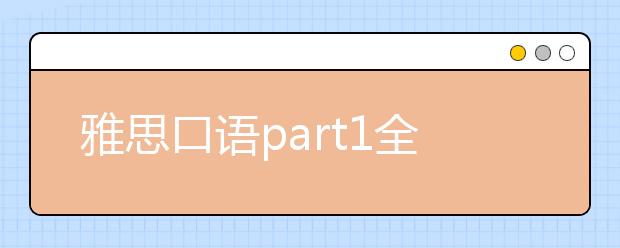当前城市:淄博[切换]
- 手机雅思无忧

扫码登录
雅思考试主要是通过对考生听、说、读、写四个方面英语能力的考核,综合测评考生的英语沟通运用能力,实现“沟通为本”的考试理念。对于雅思考生来说,也有很多考试难点和政策盲区需要帮助解答。今天雅思无忧网小编准备了雅思口语part1与part3相通的红色答题法 雅思口语name高频话题分析,希望通过文章来解决雅思考生这方面的疑难问题,敬请关注。
今天,我们来一起分享雅思口语考试中Part1和Part3这两个一问一答考试环节中的考试技巧——红色答题法(RED Answer)。掌握红色答题法,可以使我们将问题化繁为简,将答案轻松扩展,成为我们拿到雅思口语高分的关键。
红色答题法的核心:在你回答的每一句话当中,无论结论、观点怎样,都应对其进行扩充,使答案变得丰富、立体、形象。扩充的具体内容可以是原因(Reason),可以是例子(Example),也可以是细节(Detail),把这三个单词的首字母放到一起,恰恰组成了“红色”(RED),为了便于记忆,不妨称其为红色答题法。
大多数考生对雅思口语考试的形式都不陌生。雅思口语考试分为三个部分,分别是:
· Part1: Daily conversation (日常对话)
· Part2: Individual long turn (独自描述)
· Part3: Two-way discussion (双向讨论)
其中,Part2在口语考试当中与其他两个部分的形式完全不同,它需要考生按照话题卡的要求独自描述该话题卡两分钟,内容应在15-18句话为宜。一般来讲,考生只要按照话题卡上的题目要求逐一描述就可以了,我们在此不赘述。
而让广大考生感到头疼的是Part1和Part3部分。Part1部分内容相对简单,都是我们生活中经常遇到的一些场景话题,如:交友,购物,学习、电影等等。Part3部分难度有所提升,是考生和考官进行相关话题的深入讨论,内容涵盖更广泛,如:社会,教育,环境,道德等等。但是这两个部分的考试形式是完全一样的——一问一答,考官问问题,我们来回答。这恰恰是中国考生最为害怕的,因为它需要考生在极短的时间内迅速组织好语言,进行回答。这两个部分最需要的是脑力风暴(Brainstorm),因为在这两个部分中,考生不知从何谈起,容易陷入沉思。我认为,考生必须把脑力风暴发挥到极致。能否在短时间内让你的想法和观点脱口而出,取决于你思考的速度。
同时,如果我们仔细研读雅思口语考试的评分标准(Band Descriptors),就不难发现,在考查我们流利度的这一项要求中,无论是6分还是7分的评分标准,都要求考生做到一点:speaks at length. 什么意思?答案有一定长度!很多考生连语言都不知道怎样组织,又何谈做到答案有一定的长度?下面,我们来看一下红色答题法在Part1和Part3中分别怎样进行实战运用:
Part1:
在家庭话题中,考官会问到我们这样的问题:
Examiner: Do have any brothers or sisters? 你有亲兄妹吗?
这时,如果我们只回答“Yes, I do.”或者“No, I don't.”都是不妥的。考生可以思考一下:怎样运用红色答题法充实答案,并保证答案长度呢?我们不妨这样想,现在大多数考生都是独生子女,没有亲兄妹,所以很多人一时只会反应出一个“No”。然而,表哥表姐我们或许都是有的,那么,我们在这个No之后能够加入什么补充信息呢?Reason? Example? Detail? 显然,这里我们用举例子和给出原因的方法都不太合适,最好是给细节(Detail),如“only child(独生子女)”和“cousin(表兄妹)”的关键词都是我们可以加入的细节。因此,如果按以下方式回答就显得好很多:
雅思口语name高频话题分析,雅思考试分为听力、阅读、写作和口语四部分。学术类和普通类的听力和口语使用相同的试题,阅读和写作使用不同试题。大家请看以下内容,希望对大家备考雅思有所帮助。
1. Does your name have any special meaning
Yes, I was named after my grandmother. (named after) 以...命名,起名。
My name is Suntao, Tao literally means billows or large waves. 我叫孙涛,涛字面意思是波涛,海浪。
My parents named me Wangdong, something to do with the "solar term", the beginning of winter. 我父母给我起名王冬,和24节气有关,立冬。
No it doesn't. To me it's just a couple of sounds put together. 没特别的意义,对于我来说,这就是几个音拼凑在一起。
My name is NOS, was picked by my dad - Micheal Yu, it represents... 俺叫新东方,俺爹俞敏洪给我起的,它代表……
I was named Eve. I don't like it. I can't stand it for religious reasons. I don't like being named after the woman who picked the apple in the Garden of Eden. The only thing I like about it is that it's short and easy to pronounce and spell. 我叫Eve,我讨厌这个名字,我不能忍受的是宗教的原因。我不喜欢以一个在伊甸园里摘下苹果的女人而起名。唯一让我喜欢的一点就是,不长,而且容易发音,拼写。
2. Do you like your name
Yes, I got my name from my great grandmother, She past away the very same time i was born. So I was Named Elizabeth after her. Kinda bitter sweet huh kinda=kind of
It's ok, its Jennifer. Wish i had a more exciting name though.
I love my name and I dont think I would change it because its a name my parents picked out for me and im proud to have it.
I'm quite happy with my name now. I think it's pretty, fairly unique, and sort of formal (in a good way).
For the longest time, I hated my name. I wanted to change it, but I never knew how to go about doing it. Now, I am 30 and I still hate my name, but I do not want to go through the trouble of actually doing it.
3. What name do people at home (your family members) call you
Just my name, sometimes my Dad called me "son", my mom called me "babe".
They call me xxx for short, or sometimes just "darling", it's such a sweet sentiment.
Parents call me xxx, which is the best nickname i think.
4. Why are some Chinese names very similar to each other
As such the personal given name carries not only the function of the designation, but also the hope or wish the name-giver has for the name-bearer. People often find the following cases in classical given names: 因为很多人的名字不仅仅是个代号,而是代表了给他们起名字的人的希望或者愿望,人们一般选择以下这些名字:
Respect for ancestry. The specific way is to add before the name of forefathers characters like xi(希), zun(尊), xue(学), zong(宗), jing(敬), yang(仰), mu(慕), etc. And from the new name, e.g. Qian Zongni(钱宗尼),Yu Muyuan (于慕渊), Fang Jingyu(方敬御).
Wish for virtues and morals. The Chinese lays much value on the virtues and morals the young generation is hope to obtain. So characters like de(德,virtue), ren(仁,love, benevolence), yi(义, justice, righteousness), xin(信, trust, faith), qian (谦, modeaty) frequently show up in the names before. For example, Cao Mengde(曹孟德), Liu Xuande(刘玄德),Zhu De(朱德).
以上就是雅思无忧网为您准备的访问雅思无忧网(https://www.yasi.cn/),了解更多雅思考试新消息,新动态。
雅思培训 雅思口语part3常见问题突破2 雅思口语name高频话题分析
雅思口语part3常见问题突破2 雅思口语name高频话题分析
雅思考试主要是通过对考生听、说、读、写四个方面英语能力的考核,综合测评考生的英语沟通运用能力,实现“
2023年04月09日 03:51 2021年5月雅思口语题part1:Name
2021年5月雅思口语题part1:Name
雅思考试主要是通过对考生听、说、读、写四个方面英语能力的考核,综合测评考生的英语沟通运用能力,实现“
2021年07月16日 21:04 2021年1-4月雅思口语题库完整版part1:Name
2021年1-4月雅思口语题库完整版part1:Name
雅思考试主要是通过对考生听、说、读、写四个方面英语能力的考核,综合测评考生的英语沟通运用能力,实现“
2021年07月18日 00:40 2021年5月雅思口语题part1:Name
2021年5月雅思口语题part1:Name
雅思考试每年1月、5月、9月都会进行雅思口语换题,备考雅思的小伙伴们肯定想知道本次5月更新了哪些新题
2021年07月30日 14:21 2021年1-4月雅思口语题库完整版part1:Name
2021年1-4月雅思口语题库完整版part1:Name
雅思口语又到了换题季啦,相信你肯定很想知道雅思口语都考哪些题,今天新东方在线小编就给大家整理了202
2021年08月04日 23:14 2021年1-4月雅思口语part1新题:Name
2021年1-4月雅思口语part1新题:Name
推荐: Name Do you think it is dif
2021年09月23日 11:55 2021年1-4月雅思口语题库part1:Name
2021年1-4月雅思口语题库part1:Name
推荐: Name 1. Do you think it is
2021年09月23日 21:22 雅思口语part1全解析--name
雅思口语part1全解析--name
1. Name key words: Catchy 朗朗上口的 Bri
2021年09月26日 11:11 雅思口语Part1:name姓名话题
雅思口语Part1:name姓名话题
Who gave you your name? Does your name have any pa
2021年11月12日 08:35 2019年雅思口语part1 name解析
2019年雅思口语part1 name解析
事实上大家学习雅思口语范文是能对比把自己的缺点找出来,同学们需要更多的学习参考一些比较不错的雅思口语
2021年11月19日 21:18